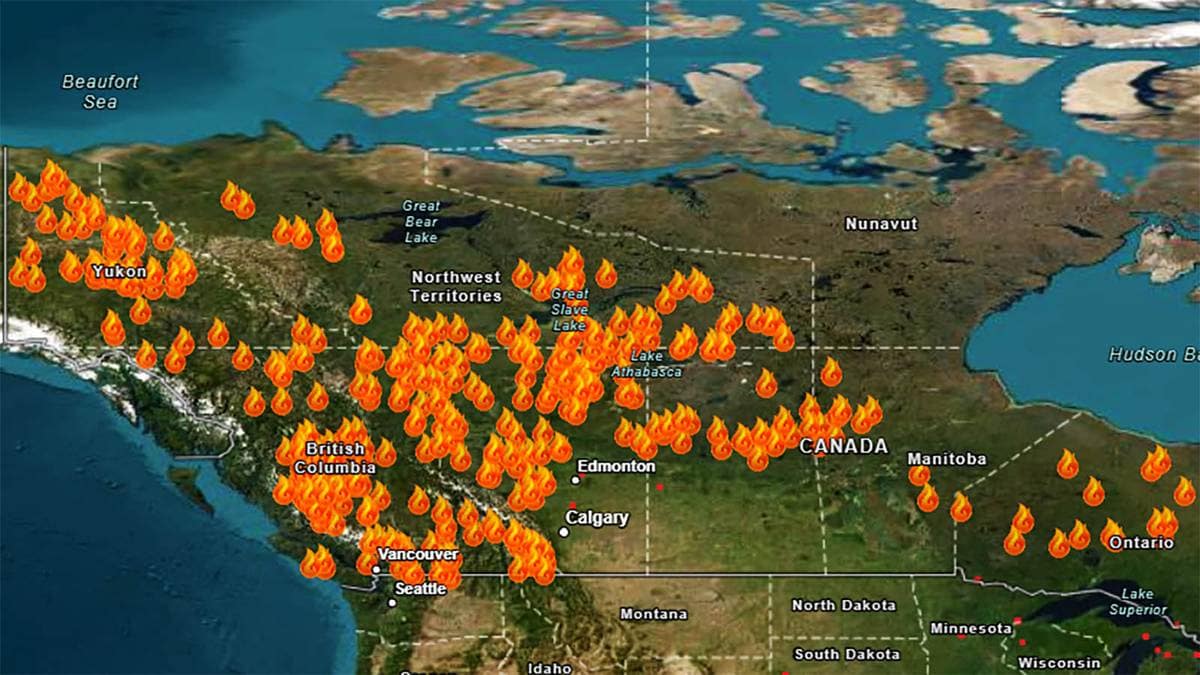This year’s wildfire season in Canada has burned much larger areas than at any time since measurements began in 1983.
So far, the fires have destroyed more than 181,000 square kilometers. This corresponds to an area half the size of Norway, or 500 lakes the size of Mjösa.
Before, the worst year for fires was 1995. Then the fires burned 71,000 square kilometers.
Find another way; This year’s fire season is two and a half times worse than the worst previously recorded.

A fire swept through West Kelowna, British Columbia, in mid-August. British Columbia is one of the provinces most affected by the fires.
Photo: Agence France-Presse
Struggling to find the words
AFP writes that researchers are struggling to find words to describe this year’s fires.
Some of the formulas used were “unprecedented,” “unprecedented in scope and duration,” and “massive long-term impacts.”
“We broke all the Canadian records,” says Yann Boulanger, a forest fire specialist with the Canadian Department of Natural Resources. Agence France-Presse describes the world as being shaken when it spoke about the fires.

A gas station caught fire in Schuyllax, British Columbia, in September. Eight firefighters lost their lives while fighting the fires this year.
Photo: AP
not finished yet
Meanwhile, this year’s wildfires are not over.
One Map from NASA It shows that over the past 24 hours, there have been several hundred fires each larger than 4 square kilometers.
Throughout Yellowknife, there is still so much smoke from the fires that people are using the same N95 masks that were used during the pandemic, according to reports. CBC.
The weather also does not inspire hope that rain and hail will stop the fires. For example, reporting Rial Temperatures above 20 degrees over the weekend.

Melanie Morin of the Society for the Protection of Forests from Fires (Sopfeu) in a deforested forest in Quebec.
Photo: AP
He may not come back
The spruce forest in Abitibi-Temiscamingu in Quebec is among the areas devastated this summer.
Reuters describes a desolate landscape where green trees reigned only months ago.
“There are no leaves on the branches, no black trunks, and no charred roots. Only a little moss survived the fire. As far as the eye can see, it is just the same desolate landscape.
-There is little chance that this forest will ever live again. The trees were too young to have cones that could ensure a new generation, says Maxence Martin, a professor of forest ecology at the University of Quebec.

This summer, massive wildfires in Canada led to dense fog in New York.
Photo: Agence France-Presse
weather changes
Like other countries further north, Canada is particularly vulnerable to climate change and global warming.
The World Weather Attribution (WWA) is a group of scientists investigating how climate change increases the likelihood of extreme weather and other phenomena.
They concluded that climate change had more than doubled the likelihood of fires hitting Quebec, eastern Canada. Canada. Researchers say this is a conservative estimate.
The real number would be higher, but it’s difficult to say how much, says one of the researchers behind the report, Friedrich Otto. The New York Times.
It will cost a lot of money
The Canadian government estimates that in a normal year it costs more than NOK 8 billion to fight fires.
This is exactly what we’re talking about when it comes to fire crews, fire aircraft and the like.
In addition, fires destroy forests and other things of enormous value. The Canadian Climate Institute estimates, according to Agence France-Presse, that the fires will halve the country’s economic growth in the coming years.

“Organizer. Social media geek. General communicator. Bacon scholar. Proud pop culture trailblazer.”

